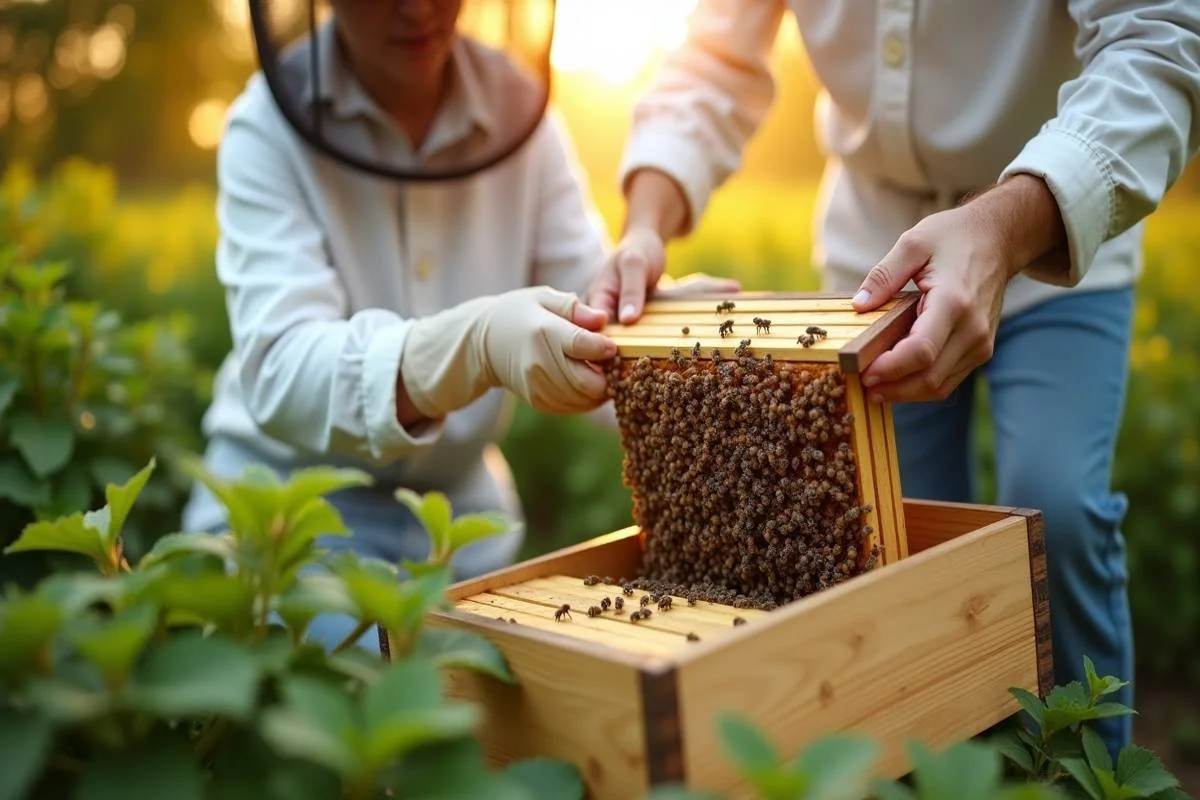Why Killing Bees Hurts Florida’s Agriculture.
Florida’s agriculture is one of the strongest in the nation, producing oranges, strawberries, tomatoes, cucumbers, and countless other crops that feed millions. But this abundance depends on one small but vital creature: the honey bee. Without bees, Florida’s farming industry—and the economy it supports—would face serious decline.
Unfortunately, many people treat bees as pests and turn to extermination when they discover a hive. While killing bees may seem like a quick fix, it directly harms Florida’s agriculture and the environment. The truth is, saving bees is not just about protecting nature—it’s about protecting the future of our food supply.
The Essential Role of Bees in Florida Agriculture
Bees pollinating orange blossoms at sunrise – a vital process for Florida’s agriculture and ecosystem.
Bees are the backbone of pollination. In Florida, honey bees pollinate over 100 different crops, including:
Citrus fruits such as oranges and grapefruits.
Berries, including blueberries and strawberries.
Vegetables like cucumbers, squash, and peppers.
Specialty crops such as watermelon, sunflowers, and nuts.
Pollination is critical to producing fruits and seeds. In fact, about one-third of the food we eat exists because of pollinators, primarily honey bees. For a state like Florida, which contributes billions of dollars annually to U.S. agriculture, bee health directly determines crop success, food prices, and farmer livelihoods.
🚫 The Hidden Consequences of Killing Bees
Extermination might solve a short-term problem at home, but it creates long-term problems for Florida’s agricultural industry.
Pollinator Decline
Florida bees are already under pressure from pesticides, disease, and habitat loss. Exterminating wild colonies further reduces populations.Agricultural Losses
Fewer bees mean lower yields. Farmers are then forced to rent bees for pollination, raising production costs and reducing supply.Disrupted Ecosystems
Bees don’t just serve farms—they support wildflowers, trees, and ecosystems across Florida. Removing them destabilizes natural biodiversity.Impact on Food Prices
Reduced pollination leads to smaller harvests. Consumers feel the impact in grocery stores, where fruits and vegetables become more expensive and less available.
🌎 Why Live Bee Removal Is the Sustainable Choice
Rather than killing bees, eco-friendly live bee removal is the responsible solution. Professional relocation services remove bees safely and transport them to controlled environments where they can continue pollinating.
Protects bee populations – Colonies are preserved instead of destroyed.
Supports Florida farmers – Bees remain active pollinators, ensuring healthy harvests.
Eco-friendly approach – Avoids toxic chemicals and environmental damage.
Long-term prevention – Live removal includes sealing entry points so hives don’t return.
At Eco Bee Removal, we specialize in safe, sustainable relocation throughout Florida. Our approach protects homes while supporting agriculture and the environment.
🍊 Florida Crops at Risk Without Bees
Bees Hurts Florida’s Agriculture.
Florida’s top crops would be directly affected by a loss of pollinators:
Blueberries – Require bee pollination for optimal fruit size and yield.
Cucumbers and squash – Depend almost entirely on honey bees.
Citrus fruits – Bee pollination improves both quality and quantity.
Watermelons – Cannot thrive without strong pollinator activity.
If bees were eliminated, these industries would decline, threatening both Florida farmers and national food security.
⚠️ Florida’s Declining Bee Populations
Florida has already experienced troubling declines in bee health. Beekeepers report annual losses of 30–40% of colonies, often due to Colony Collapse Disorder (CCD), pesticide exposure, and extreme weather. Killing bees in residential areas adds unnecessary pressure to already fragile populations.
The ripple effects are significant: fewer bees mean weaker ecosystems, reduced crop pollination, and higher costs for farmers and consumers alike.
🌿 How Floridians Can Help Protect Bees
Protecting bees isn’t only the responsibility of farmers or professionals—it’s something every homeowner can contribute to.
Call for live bee removal instead of extermination.
Avoid harmful pesticides in lawns and gardens.
Plant pollinator-friendly flowers to create natural habitats.
Educate others about the role bees play in Florida’s food supply.
Small steps, multiplied across thousands of households, can protect pollinators and secure Florida’s agricultural future.
✅ Final Thoughts
Killing bees may appear to solve an immediate problem, but the long-term damage to Florida’s agriculture is too great to ignore. Bees are not pests—they are essential partners in food production. By choosing eco-friendly bee removal, Floridians can protect their homes while ensuring a strong agricultural economy for generations to come.
At Eco Bee Removal, we are committed to safe, humane relocation that supports pollinator health, farmers, and the environment. Together, we can protect bees and safeguard Florida’s future.


